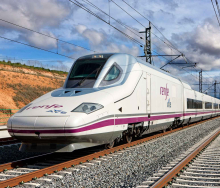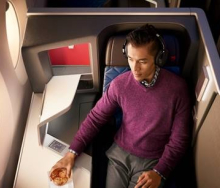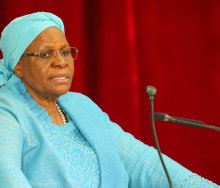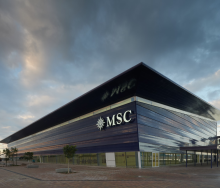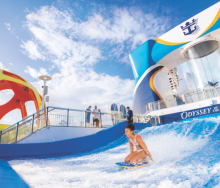EU airlines are briskly consolidating - they need to scale up in order to compete on international routes with the super-carriers of the US and the evolving giants of the Middle East.
But EU regulators could exert drag on or even block these EU airlines’ efforts to achieve scale due to increasingly stringent EU competition rules - rules to which non-EU airlines are not subject in their homes.
EU antitrust regulators could now block Lufthansa’s bid for a minority stake in Italian state-owned carrier ITA (previously Alitalia), for fear it will result in insufficient competition on shorthaul air routes between Italy and Central Europe and also long-haul routes between Italy and North America, Japan and India.
Lufthansa is attempting to acquire a 41% stake in ITA, reportedly for the sum of E325 million (R6,6 billion), part of a capital increase. The German group intends to take a majority stake in ITA in the future.
Italian prime minister Giorgia Meloni has already expressed frustration over the Commission’s approach regarding the acquisition of the Italian carrier, and the Italian government says it intends to proceed with its plans to sell the stake in the airline, and it hopes for a verdict before the stated deadline of June 6, so that the airlines could still take advantage of the European peak travel season.
The investigation will look into the idea that ITA and Lufthansa, plus LH’s transatlantic joint venture partners United Airlines and Air Canada, could be treated as a single entity after the merger. The regulators also fear that ITA would hold a dominant position at Milan Linate airport.
As EU regulators tighten the screws, airlines complain that the slot concessions required of them at key hubs can make the price of the deal too high, and they want regulators to take a global view.
However, indications are that the Commission may toughen its stance on airline mergers.
Last November, Lufthansa Group CE, Carsten Spohr, said: “With the geopolitical situation, Europe more and more is turning its attention towards being globally competitive.
“I think Europe and the EU Commission have understood that we need to look after European interests on a global scale.”
To be globally competitive, said Spohr, all the European airline groups, including Lufthansa Group’s two competitors (IAG and the AF-KLM Group) needed to grow to the same level as other global players, reports flightglobal.com.
“The three American [airline groups] are already number one, two and three in our industry” said Spohr, referring to the global supremacy of Delta Air Lines, American Airlines Group and United Airlines Holdings. He added that the logical next step would be the integration of ITA into Lufthansa.
Last year Spohr pointed out ITA’s low marketshare on Italian routes (9% of seat capacity vs Ryanair’s 33%). He had expected this to lead to a speedy resolution of the acquisition of the 41% share.
Other EU consolidations
IAG, the mother company of BA and Iberia, is reported by flightglobal.com to have been trying since before the pandemic to complete a deal to add Spanish carrier Air Europa to the group. IAG already owns 20% of the Spanish carrier and the new deal is one of complete ownership.
But the European Commission announced late in January that it has opened an in-depth investigation into this deal too. Once again the reason was the fear the deal could lower competition on several domestic, short-haul and long-haul routes.
Said IAG CE, Luis Gallego last October: “I hope the approach is going to be to help consolidation in the market in order to help airlines in Europe be more sustainable…We need to compete in a global world with a group of airlines and we need to have scale.”
Gallego also pointed out that scale will be important for airlines to achieve sustainability targets. “We have committed to comply with the mandate. So I hope the approach is going to be to help the consolidation in the market in order to help airlines in Europe to be sustainable,” he said.
Meanwhile AF-KLM has led a consortium in a successful US$1,2 billion (R22,7 billion) bid to buy Scandinavian Airlines which is in Chapter 11 restructuring. Air France-KLM is taking a 20% stake in SAS, but the deal also opens a route to the French-Dutch company gaining a majority stake in the future. The parties await the EU regulators’ approval.
The SAS investment has not diminished Air France-KLM’s appetite for a takeover of Portuguese carrier, TAP. According to Reuters, AF-KL is so keen that it is prepared to wait an extra year for that deal, following the sudden resignation of Portugal’s Prime Minister Costa in November 2023.
Lufthansa and IAG are also believed to be interested in TAP.
For the past 10 years, Ryanair CEO, Michael O’ Leary has predicted that when the “smoke of consolidation” clears in Europe, only five big players will exist. O’Leary has said that aside from niche airlines, whose routes are not of interest to the big players, the last airlines left standing in Europe are bound be Ryanair, easyJet, IAG Group (including Aer Lingus, British Airways, Iberia, Vueling and Level), Air France-KLM (including Transavia) and the Lufthansa Group, comprising Lufthansa, Austrian Airlines, Swiss, Brussels Airlines and presumably, ITA Airways.



